- Home
- P. D. James
A Certain Justice Page 3
A Certain Justice Read online
Page 3
The prosecution had relied largely on one witness, the neighbour, Mrs. Scully, who said in her examination-in-chief that she had seen Garry leaving the house by the front door at quarter past eleven. The jury had seen Mrs. Scully in the witness box. She may have struck them, as surely she did everyone who had heard her, as an honest witness trying to tell the truth. But what she had briefly seen was a male figure at night under the high sodium lights designed to shine brightly on the busy road, but apt to throw confusing shadows over the fronts of the houses. At the time she was wearing spectacles through which she couldn’t even clearly see the faces on her television screen at less than ten feet. In cross-examination she had told the jury: “I suppose it could have been someone like him. But I thought at the time it was Garry.” The jury might feel that Mrs. Scully’s identification of Garry Ashe, central to the prosecution’s case, could not be relied upon.
She ended: “Garry Ashe has told you that he went for that night walk because he couldn’t face his aunt when she returned home from the Duke of Clarence pub, drunk, as he knew she would be. He needed time to think about their life together, about his future, whether it was time to leave. In his own words in the witness box: ‘I had to decide what I was going to make of my life.’ Remembering those obscene photographs, which I am sorry you had to see, you may wonder why he didn’t leave before. He has told you why. She was his only living relation. The home she provided was the only home he had ever known. He thought that she needed him. Members of the jury, it is hard to walk out on someone who needs you, however inconvenient, however perverse that need.
“So he walked unseeing and unseen through the night and returned to the horror of that blood-splattered sitting-room. There is no forensic evidence to link him with the crime. The police found no blood on his clothes or his person, his fingerprints were not on that knife. Any one of her numerous clients could have called that night.
“Members of the jury, no one deserves to be murdered. A human life is a human life whether the victim is a prostitute or a saint. In death as in life we are all equal before the law. Mrs. O’Keefe did not deserve to die. But Mrs. O’Keefe, like all prostitutes—and that, members of the jury, is what she was—put herself peculiarly at risk because of her lifestyle. You have heard what that lifestyle was. You have seen the photographs which her nephew was induced or compelled to take. She was a sexually rapacious woman who could be affectionate and generous but who, in drink, was abusive and violent. We do not know who it was she let in that night or what happened between them. The medical evidence is that no sexual act took place immediately before death. But is it not overwhelmingly likely, members of the jury, that she was murdered by one of her clients, killed out of jealousy, rage, frustration, hatred or the lust to kill? It was a murder of great brutality. Half drunk, she opened her door to her murderer. That was her tragedy. It is also a tragedy for the young man who is in the dock in this court today.
“My learned friend, in his opening address, put the matter to you quite clearly. If you are convinced beyond reasonable doubt that my client murdered his aunt, then your verdict must be one of guilty. But if, after considering all the evidence, you have a reasonable doubt that it was indeed his hand that struck down Mrs. O’Keefe, then it will be your duty to return a verdict of not guilty.”
All judges are actors. Mr. Justice Moorcroft’s forte, a part which he had played for so many years that it had become instinctive, was a courteous reasonableness occasionally enlivened with shafts of mordant wit. During his summing up it was his habit to lean well forward towards the jury, a pencil delicately spanning the first finger of each hand, and address them as equals who had kindly agreed to give up their valuable time to assist him with a problem which had its difficulties, but, as with all human concerns, was susceptible to reason. The summing up, as always with this judge, was exemplary in its comprehensiveness and fairness. There could be no appeal in a court of law on the grounds of misdirection; with this judge there never had been.
The jury listened with impassive faces. Watching them, Venetia thought, as she often did, that it was a curious system but one which worked remarkably well provided that your first priority was the protection of the innocent rather than the conviction of the guilty. It wasn’t designed—how could it be?—to elicit the truth, the whole truth and nothing but the truth. Even the Continental inquisitorial system couldn’t do that. It would have gone hard with her client if it had.
There was nothing more that she could do for him now. The jury were given their charge and filed out. The judge rose, the court bowed and waited, standing, until he had left. Venetia heard above her the murmuring and shuffling as the public gallery emptied. She had nothing to do now but to await the verdict.
2
In Pawlet Court, on the western boundary of the Middle Temple, the gas lamps were glowing into light. Hubert St. John Langton, Head of Chambers, watched from his window as he had on every evening when he had been working in Chambers, for the last forty years. It was the time of the year, the time of day, that he loved best. Now the small court, one of the loveliest in the Middle Temple, took on the soft refulgent glow of an early-autumn evening, the boughs of the great horse chestnut seeming to solidify as he watched, the rectangles of light in the Georgian windows enhancing the atmosphere of ordered, almost domestic, eighteenth-century calm. Beneath him the cobbles between the pavements of York stone glistened as if they had been polished. Drysdale Laud moved up beside him. For a moment they stood in silence, then Langton turned away.
He said: “That’s what I’m going to miss most, the lighting of the lamps. But it’s not quite the same now they’re automatic. I used to like watching for the lamplighter to come into the court. When that stopped, it seemed as if a whole era had gone for ever.”
So he was going, he’d actually made up his mind at last. Laud carefully kept from his voice either surprise or regret. He said: “This place is going to miss you.”
There could hardly, he thought, have been a more banal exchange over a decision he had been awaiting with increasing impatience for over a year. It was time for the old man to go. He wasn’t very old, not yet seventy-three, but in the last year Laud’s critical anticipatory eyes had seen the gradual but inexorable draining of powers physical and mental. Now he watched as Langton seated himself heavily at his desk, the desk that had been his grandfather’s and which he had hoped one day might be his son’s. That hope, like so many others, had been swept away in that avalanche above Klosters.
He said: “I suppose the tree will have to go eventually. People complain that it shuts out too much light in summer. I’ll be glad not to be here when they take the axe to it.”
Laud felt a small surge of irritation. Sentimentality was something new for Langton. He said: “It won’t be an axe, it will be a heavy-duty chainsaw, and I don’t suppose they’ll do it. The tree is protected.” He waited for a moment, then asked with studied unconcern: “When were you thinking of leaving?”
“At the end of the year. Once these decisions are made there’s no point in dragging things out. I’m telling you now because we need to give thought to my successor. There’s the Chambers meeting coming up in October. I thought we might discuss it then.”
Discuss? What was there to discuss? He and Langton had run Chambers between them for the last ten years. The two archbishops—wasn’t that how Chambers spoke of them? Colleagues might use the words with an undertone of slight resentment, even of derision, but they expressed a reality. He decided to be frank. Langton had become increasingly vague and indecisive, but surely not about this. He had to know where he stood. If there was going to be a fight it was better to be prepared.
He said: “I’d rather thought that you wanted me to succeed you. We work together well. I thought that Chambers had come to take it for granted.”
“That you were crown prince? I expect they have. But it might not be as straightforward as I expected. Venetia is interested.”
“Venetia? This is t
he first I’ve heard of it. She’s never shown the slightest interest in becoming Head of Chambers.”
“Not until now. But I’ve heard a rumour that she’s changed her mind. And she is, of course, the senior. Only just, but there it is. She was called a term before you.”
Laud said: “Venetia made her position perfectly plain four years ago, when you were off for two months with glandular fever and we had a Chambers meeting. I asked her then whether she wanted to take the chair. I remember her reply perfectly. ‘I have no ambition to occupy that seat either temporarily or when Hubert decides to vacate it.’ What part has she ever played in running this place, in the more tedious chores, even in the finance? All right, she comes to Chambers meetings and protests at whatever other people propose, but what does she actually do? Her own career has always come first.”
“Perhaps this is about her career. I’ve been wondering if she might not have an ambition to become a judge. She’s apparently enjoying sitting as an assistant recorder. If so, succeeding me as Head of Chambers would be important to her.”
“It’s important to me. For God’s sake, Hubert, you can’t let her cut me out because I happened to have appendicitis at the wrong time. The only reason she’s senior to me is because I was in the operating theatre on the day she was called. It put me a term behind. I don’t think Chambers is going to choose Venetia because she was called in the Michaelmas term and I was forced to wait until the Lent.”
Langton said: “But it does make her senior. If she wants the job it will be embarrassing to reject her.”
“Because she’s a woman? I thought we’d come to that. Well, it may terrify the more timid members of Chambers but I think they’ll put fairness over political correctness.”
Langton said mildly, “But it isn’t exactly political correctness, is it? We do have a policy. There is a code of practice on sexual discrimination. That’s what it’s going to look like if we pass her over.”
Trying to control the mounting anger in his voice, Laud said: “Has she spoken to you? Has she actually said she wants it?”
“Not to me. Someone—I think it was Simon—said she’d hinted at it to him.”
It would be Simon Costello, thought Laud. Number Eight, Pawlet Court, like all Chambers, was a hotbed of gossip, but Simon’s contribution to it was notorious for inaccuracy. If you wanted reliable news you didn’t go to Simon Costello.
He said: “It’s pure guesswork. If Venetia wanted to initiate a campaign she’d hardly begin with Simon. He’s one of her bêtes noires.” He added: “It’s important to avoid a contest if it’s at all possible. It’ll be fatal if we descend to personalities. Chambers could become a bear garden.”
Langton frowned: “Oh, I hardly think so. If we have to vote, that’s what we’ll do. People will accept the majority decision.”
Laud thought with some bitterness: And you no longer care. You won’t be here. Ten years of working together, of covering up your indecision, of advising without appearing to advise. And you do nothing. Don’t you realize that defeat would be, for me, an intolerable humiliation?
He said: “I can’t think she’ll have much support.”
“Oh I don’t know. She’s probably our most distinguished lawyer.”
“Oh, come off it, Hubert! Desmond Ulrick is our most distinguished lawyer beyond question.”
Langton stated the obvious. “But Desmond won’t want it when the time comes. I doubt whether he’ll even notice the change.”
Laud was calculating. He said: “The people at the Salisbury Annexe and those who work mainly from home probably care less than those physically in Chambers, but I doubt whether more than a minority will want Venetia. She’s not a conciliator.”
“But is that what we need? There are going to have to be changes, Drysdale. I’m happy I shan’t be here to see them, but I know they’ll come. People talk about managing change. There’ll be new people in Chambers, new systems.”
“Managing change. That fashionable shibboleth. Venetia might well manage change, but will they be the changes that Chambers want? She can manage systems; she’d be disastrous at managing people.”
“I thought you liked her. I’ve always seen you—well, I suppose as friends.”
“I do like her. In so far as she has a friend in Chambers, I’m that friend. We share a liking for mid-twentieth-century art, we go occasionally to the theatre, we dine out about once every two months. I enjoy her company, presumably she enjoys mine. That doesn’t mean I think she’ll make a good Head of Chambers. Anyway, do we want a criminal lawyer? They’re a minority here. We’ve never looked to the criminal Bar for the Head of Chambers.”
Langton answered an objection understood but not stated. “Isn’t that rather a snobbish view? I thought we were getting away from that. If law has to do with justice, with people’s rights, their liberty, their freedom, isn’t what Venetia does more important than Desmond’s preoccupation with the minutiae of international maritime law?”
“It may be. We’re not discussing relative importance, we’re choosing the Head of Chambers. Venetia would be a disaster. And there are one or two other matters which we’ll have to discuss at Chambers meeting on which she’ll be difficult. What pupils to take on as tenants, for example. She won’t want Catherine Beddington.”
“She’s Catherine’s sponsor.”
“That will make her objections more compelling. And there’s another thing. If you’re hoping to get Harry an extension of his contract, forget it. She wants to do away with the Senior Clerk and appoint a practice manager. That’ll be the least of the changes if she gets her way.”
There was another silence. Langton sat at his desk as if spent. Then he said: “She seems to have been a bit on edge in the last few weeks. Not herself. Is anything wrong, do you know?”
So he had noticed. That was the difficulty with premature senility. You could never be sure when the gears in the mind might not engage again, the old Langton disconcertingly assert himself.
Laud said: “Her daughter’s home. Octavia left boarding school in July and I gather she’s done nothing since. Venetia’s let her have the basement flat so they shouldn’t be on top of each other, but it isn’t easy. Octavia’s not yet eighteen, she needs some control, some advice. A convent education is hardly the best preparation for running around London unsupervised. Venetia’s over-busy, she can do without the worry. And they’ve never got on. Venetia isn’t maternal. She’d be a good enough mother to a beautiful, clever, ambitious daughter, but that’s not the kind she’s got.”
“What happened to her husband after the divorce? Is he still in the picture?”
“Luke Cummins? I don’t think she’s seen him for years. I’m not sure he even sees Octavia. I believe he’s married again and lives somewhere in the West Country. Married to a potter or a weaver. A craftsperson of some kind. I’ve got a feeling they’re not well off. Venetia never mentions him. She’s always been ruthless in writing off her failures.”
“I suppose that’s all that’s wrong, worry about Octavia?”
“It’s enough, I should have thought, but I’m only guessing. She doesn’t talk to me about it. Our friendship doesn’t extend to personal confidences. The fact that we go to an occasional exhibition together doesn’t mean that I understand her—or any other woman, come to that. It’s interesting, though, the power she exerts in Chambers. Has it ever occurred to you that a woman, when she is powerful, is more powerful than a man?”
“Powerful in a different way, perhaps.”
Laud said: “It’s a power partly based on fear. Perhaps the fear is atavistic, memories of babyhood. Women change the nappy, give the breast or withhold it.”
Langton said with a faint smile: “Not now, apparently. Fathers change nappies and it’s usually a bottle.”
“But I’m right, Hubert, about power and fear. I wouldn’t say it outside these walls, but life in Chambers would be a great deal easier if Venetia fell under that convenient Number 11 bus.” He pa
used, and then asked the question to which he needed an answer. “So I have your support, have I? Can I take it that I’m your choice to succeed you as Head of Chambers?”
The question had been unwelcome. The tired eyes looked into his and Langton seemed to shrink back in his chair as if bracing himself against a physical attack. And when he spoke Laud didn’t miss that quavering note of petulance.
“If that is the will of Chambers, of course you will have my support. But if Venetia wants it I don’t see how she can reasonably be rejected. It goes by seniority. Venetia is the senior.”
It wasn’t enough, thought Laud bitterly. By God, it wasn’t enough.
He stood looking down at the man he had thought was his friend and, for the first time in that long association, it was a look more judgemental than affectionate. It was as if he were seeing Langton with the critical, unclouded eyes of a stranger, noting with detached interest the first ravages of merciless time. The strong regular features were losing flesh. The nose was sharper and there were hollows under the jutting cheekbones. The deep-set eyes were less clear and beginning to hold the puzzled acceptance of old age. The mouth, once so firmset, so uncompromising, was slackening into an occasional moist quaver. Once his had been a head formed, or so it seemed, to be topped by a judge’s wig. And that surely was what Langton had always hoped for. Despite the success, the satisfaction in succeeding his grandfather as Head of Chambers, there had always hung about him the uncomfortable whiff of hopes unrealized, of a talent which had promised more than it had achieved. And like his grandfather, he had stayed on too long.

 The Skull Beneath the Skin
The Skull Beneath the Skin A Taste for Death
A Taste for Death The Children of Men
The Children of Men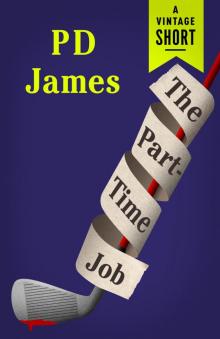 The Part-Time Job
The Part-Time Job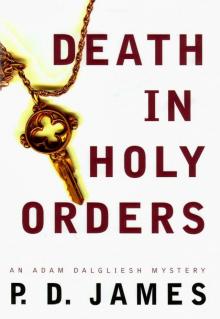 Death in Holy Orders
Death in Holy Orders The Victim
The Victim Shroud for a Nightingale
Shroud for a Nightingale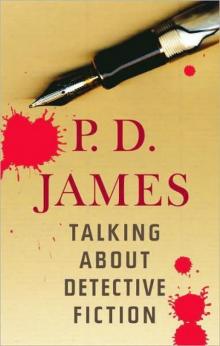 Talking about Detective Fiction
Talking about Detective Fiction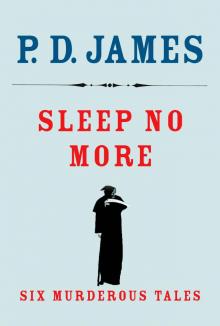 Sleep No More
Sleep No More The Mistletoe Murder and Other Stories
The Mistletoe Murder and Other Stories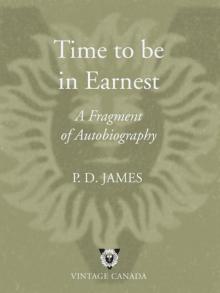 Time to Be in Earnest
Time to Be in Earnest Original Sin
Original Sin A Mind to Murder
A Mind to Murder Cover Her Face
Cover Her Face Innocent Blood
Innocent Blood Devices and Desires
Devices and Desires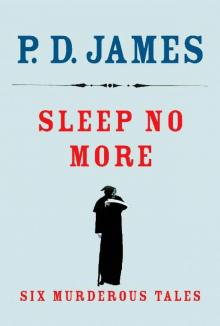 Sleep No More: Six Murderous Tales
Sleep No More: Six Murderous Tales Death Comes to Pemberley
Death Comes to Pemberley The Mistletoe Murder
The Mistletoe Murder Death of an Expert Witness
Death of an Expert Witness The Private Patient
The Private Patient The Black Tower
The Black Tower Devices & Desires - Dalgleish 08
Devices & Desires - Dalgleish 08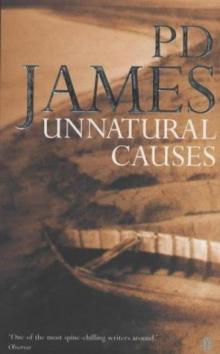 Unnatural Causes
Unnatural Causes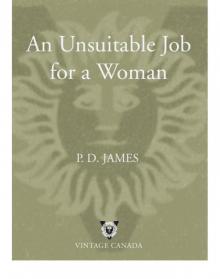 An Unsuitable Job for a Woman
An Unsuitable Job for a Woman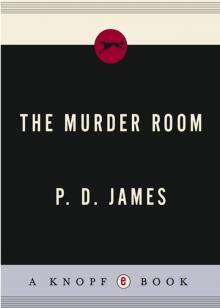 The Murder Room
The Murder Room A Certain Justice
A Certain Justice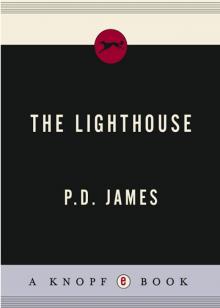 The Lighthouse
The Lighthouse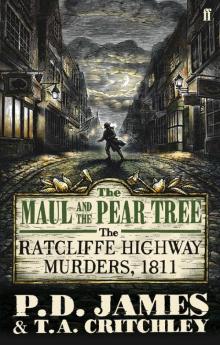 The Maul and the Pear Tree
The Maul and the Pear Tree